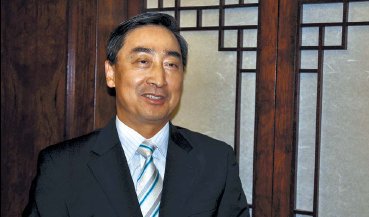HONG KONG -- The Korean Consulate General in Hong Kong was established in May 1949, making it one of the first five overseas missions that were set up after the founding of the Korean government.
Over the past 60 years, continuing developments in political, economic, trade, culture and people exchanges have created a robust mutual relationship.
“Based on decades of developments, the cooperation on finance, tourism, cultural exchanges and other areas broadened,” Jun Ok-hyun, consul general in Hong Kong, told The Korea Herald.
Passenger traffic between Korea and Hong Kong reached 1 million in 2008.
“Though the figures shrank a little after the 2009 financial crisis, the volume bounced back by 40 percent in the first half of this year, compared with the figures of the same period a year ago,” he pointed out.
If the numbers keep heading upward, it is forecast that 1 million passengers will be traveling between the two areas this year.
In February last year, Chief Executive Donald Tsang visited Korea and announced the signing of the Working Holiday Scheme between the two governments.
As for business, Hong Kong is Korea’s sixth largest trading partner, fourth largest export market and fifth major investment region, with $9.2 billion invested in Hong Kong as of the end of last year.
Over the past 60 years, continuing developments in political, economic, trade, culture and people exchanges have created a robust mutual relationship.
“Based on decades of developments, the cooperation on finance, tourism, cultural exchanges and other areas broadened,” Jun Ok-hyun, consul general in Hong Kong, told The Korea Herald.
Passenger traffic between Korea and Hong Kong reached 1 million in 2008.
“Though the figures shrank a little after the 2009 financial crisis, the volume bounced back by 40 percent in the first half of this year, compared with the figures of the same period a year ago,” he pointed out.
If the numbers keep heading upward, it is forecast that 1 million passengers will be traveling between the two areas this year.
In February last year, Chief Executive Donald Tsang visited Korea and announced the signing of the Working Holiday Scheme between the two governments.
As for business, Hong Kong is Korea’s sixth largest trading partner, fourth largest export market and fifth major investment region, with $9.2 billion invested in Hong Kong as of the end of last year.

Trade between the two countries reached $21 billion “even at times of the financial crisis last year,” Jun noted.
Following this year’s global economic recovery, the value of Korea’s exports to Hong Kong was $7.7 billion as of the end of April, an increase by 45 percent over the same period last year.
Currently there are over 500 Korean firms making investments in Hong Kong.
“The potential of cooperation between Korea and Hong Kong business sectors is huge as they are complementary to each other,” said Jun.
“The six industries that the Hong Kong government promotes, especially the environmental protection and the creative industries, also offer opportunities for Korean businessmen in Hong Kong,” he added.
To further this relationship, representatives of the financial sectors and entrepreneurs of the two areas will meet at the Korea-Hong Kong Business Round Table in Seoul this month. The last such meeting was held four years ago.
The consul general explained that the sales of such Korean electronics “also have been boosted by the Korean Wave.”
“Korean idols and K-pop, from ballet to hip-hop, grab the heart of Hong Kong people,” he said. “Local newspapers cover news on Korean stars every day and readers follow the news of the Korean entertainment industry.”
In fact, one of the hottest tickets in town right now is the movie “Harmony,” staring Kim Yun-jin, Na Mun-hee and Kang Ye-won.
The popularity of Korean pop culture has spawned another industry, the learning of the Korean language.
More than half of the universities in Hong Kong offer Korean language courses at degree level.
The number of people taking the Test of Proficiency in Korean exam has been rising in recent years as the Korean Wave crashed onto Hong Kong’s shores.
“Korean novels, of which people used to read the Chinese translation in the past, are now available in Korean, as more readers can comprehend the language,” Jun said.
As for television dramas, Jun said 27 Korean dramas have aired on seven Hong Kong channels.
As for food promotion, Jun is happy to see 40 Korean restaurants operating in Hong Kong, a 60 percent increase from just a few years ago.
Currently there are about 12,000 Korean residents in Hong Kong. Most of them are Korean company employees dispatched from Seoul. Many of the self-employed Koreans in Hong Kong engage in trade, logistics, food and tourism industries.
“The local government officers affirm that the Korean community plays an important role and contributes to Hong Kong society,” Jun said.
One of the six industries Tsang is looking to promote is education. Following this initiative, the missions in Hong Kong and Seoul are interested in promoting this sector.
More than 50 international schools in Hong Kong offer American, British and Chinese curricula-based education with the International Baccalaureate also offered in some schools.
The Korean International School in Hong Kong provides both the Korean national curriculum (preschool-grade 12) and intensive English education.
In the English section of KIS there are 246 students of 22 different nationalities.
“KIS is making efforts to promote its English section,” Jun said. “From 2006, KIS has been offering English immersion curriculum to the students between pre-school and G6.”
By Yoav Cerralbo (yoav@heraldcorp.com)





![[Herald Interview] 'Amid aging population, Korea to invite more young professionals from overseas'](http://res.heraldm.com/phpwas/restmb_idxmake.php?idx=644&simg=/content/image/2024/04/24/20240424050844_0.jpg&u=20240424200058)











![[KH Explains] Korean shipbuilding stocks rally: Real growth or bubble?](http://res.heraldm.com/phpwas/restmb_idxmake.php?idx=652&simg=/content/image/2024/04/25/20240425050656_0.jpg&u=)

